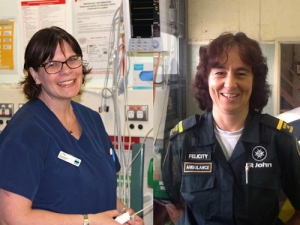Pay Equity Crucial for Rural Communities - RWNZ
Rural Women New Zealand (RWNZ) says it welcomes the release of a new report into pay equity.
 Access Community Health and Rural Women New Zealand Scholarship winners Jo Tiller on the left and Felicity Lallier on the right.
Access Community Health and Rural Women New Zealand Scholarship winners Jo Tiller on the left and Felicity Lallier on the right.
For the first time in the history of the Access Community Health and Rural Women New Zealand (RWNZ) scholarship there are two recipients.
The standard of applications was very high and the review panel could not separate the top two applicants. Felicity Lallier from Horowhenua and Jo Tiller from Greymouth will each receive a $3000 fund to help support their health-related post graduate studies.
For Jo Tiller, caring is very much in the genes. Her father was a consultant physician and her mother worked as a nursing sister, exposing Tiller to the world of health care from an early age. Tiller plays a crucial role at Greymouth hospital where, having specialised in post anaesthesia care and recovery, she will be consolidating all her skills through her Post Graduate Diploma in Health Sciences - Rural Nursing.
"I'm very passionate about my nursing and consider it a gift to be able to help people recover," says Tiller.
"We help treat people from across the entire West Coast. Many people in our rural community have seasonal and outdoor livelihoods and often want their care and treatments catered around that. I am really inspired by the patient's motivation and commitment to their role in the community."
Felicity Lallier entered the health profession as a paramedic fairly late in life. Originally from New Zealand, she trained in the United States where she saw many differences in the types of emergencies compared with her home in Horowhenua.
"There were a lot a big trauma situations whereas, here with such a large population of older people, we see a lot of falls and wound care," she says. "In the United States we had access to closer facilities unlike here where patients can be 45-60 minutes away from emergency care."
Lallier has a Paramedic Bachelor's degree from Whitireia and is now studying for a Post Graduate Diploma in Health Science Paramedicine while working part time as an Intensive Care Paramedic with St John.
Lallier's qualification and training will mean she will be able to provide an invaluable and extensive service to the rural community, consolidating a number of clinical skills including being able to use antibiotics and treating patients on the spot.
Access Community Health chief executive, Simon Lipscombe, says both women reflect the importance of the services provided, by helping support people to remain independent in their communities and homes.
"We were impressed by the passion they both showed for their rural areas and their desire to continue their studies. We recognised the great benefits this would bring to the rural communities they serve."
To ensure each recipient would receive $3000, Access Community Health and RWNZ contributed extra funds towards this year's scholarship.
RWNZ's health portfolio spokesperson Margaret Pittaway says "both women were outstanding in their commitment to their profession and very focused on using post-graduate health studies to improve care and treatment of patients in the rural community".
Budou are being picked now in Bridge Pā, the most intense and exciting time of the year for the Greencollar team – and the harvest of the finest eating grapes is weeks earlier than expected.
The Real Estate Institute of New Zealand (REINZ) has released its latest rural property report, providing a detailed view of New Zealand’s rural real estate market for the 12 months ending December 2025.
Rural retailer Farmlands has released it's latest round of half-year results, labeling it as evidence that its five-year strategy is delivering on financial performance and better value for members.
OPINION: "We are back to where we were a year ago," according to a leading banking analyst in the UK, referring to US president Donald Trump's latest imposition of a global 10% tariff on all exports into the US.
DairyNZ says the Government’s proposed Resource Management Act reform needs further work to ensure it delivers on its intent.
Overseas Trade Minister Todd McClay says he's working constructively with the Labour Party in the hope they will endorse the free trade agreement (FTA) with India when the agreement comes before Parliament for ratification.

OPINION: A mate of yours truly reckons rural Manawatu families are the latest to suffer under what he calls the…
OPINION: If old Winston Peters thinks building trade relations with new nations, such as India, isn't a necessary investment in…